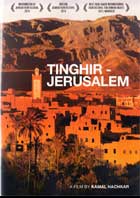
Tinghir-Jerusalem 2011
Distributed by Icarus Films, 32 Court St., 21st Floor, Brooklyn, NY 11201; 800-876-1710
Produced by Les Films d’un Jour
Directed by Kamal Hachkar
DVD , color, 86 min.
High School - General Adult
Africa, Judaism, Middle East
Date Entered: 05/19/2015
Reviewed by Sandra Collins, Byzantine Catholic Seminary Library, Pittsburgh, PALike any good story about self-discovery, this film starts with a journey. Frenchman Kamal Hachkar is ethnically a Berber Muslim who lacks a sense of place. He opens the film saying, “The only thing I was sure of is that I came from elsewhere.” So, he travels back to his ancestral homeland—a small village in Morocco called Tinghir—and there discovers a piece of forgotten history. Tinghir was once a picture of peaceful coexistence between the Berber Muslims and a thriving Jewish community, who gradually left over time to settle in the State of Israel.
Hachkar asks residents over and over again why the Jews left. Most of the Muslim inhabitants have memories of peaceful coexistence but can offer few insights except to say that they were sorry to see them go as they had grown up cheek-to-jowl with these families, separated only by their religious practices but little else. Some express actual hurt that their fellow inhabitants would feel less than welcome in Tinghir. Hachkar then travels to meet some of these Tinghir Jews, many now elderly and settled in Israel, still full of fond memories for their lives back in Morocco. Such wistfulness begs the question, why then did the Jews leave?
What emerges is a tale of divide and conquer. Hachkar suggests that French colonial aspirations focused on imposing a pan-European culture upon Morocco, effectively disenfranchising both Muslims and Jews. At the same time, after Israel declared independence in 1948 and Morocco aligned with the Arab League, the Moroccan Jews felt isolated. Into this mix came Zionist agitators who painted an idealized picture of an Israeli utopia; they actively worked to resettle the Moroccan Jews in Israel. Most left willingly but arrived in Israel at a time of overwhelming European Jewish immigration. Suddenly, Berber Jews were relegated to second-class citizenship in relation to the majority Ashkenazi immigrants. Even decades after resettlement, many of the Berber Jews in the film speak as if their time in Israel is yet another exile, rather than the promised homecoming.
Hachkar concludes, “It’s only through the other that one can begin to know himself.” It’s not clear if Hackhar is any closer to his own sense of place by the end of the film but it’s clear he feels great sympathy for this piece of lost history—for the Jews as well as the Muslims—from Tinghir. Recommended.
Awards
- Best Documentary, International Berber Film Festival 2013, France
- Best Documentary, Jewish Eye Festival 2012, Israel
- Ahmed Attia Award for the Dialogue of Cultures, Medimed Market, 2012, Spain
- Best Film, Rabat International Film Festival for Human Rights, 2012, Morocco